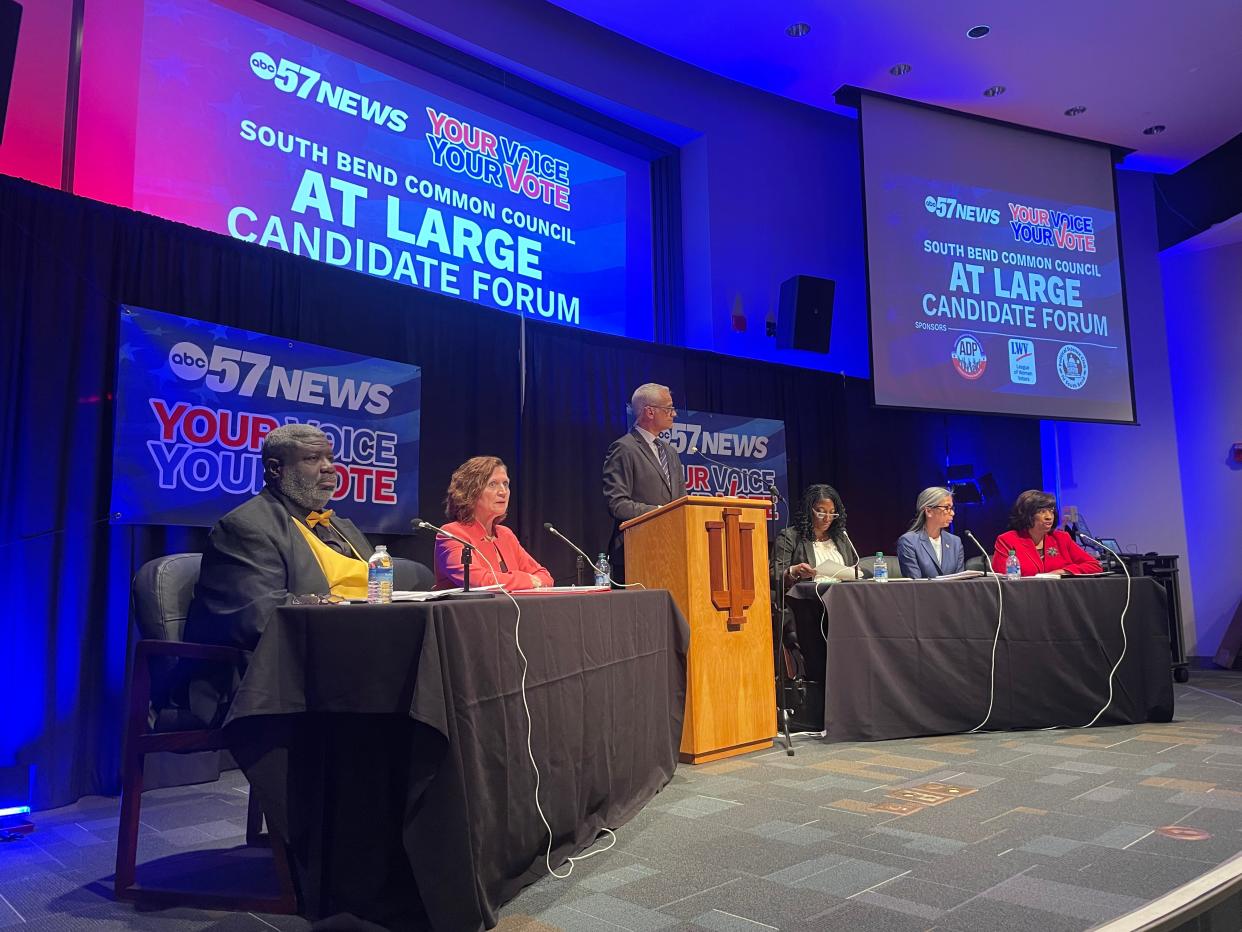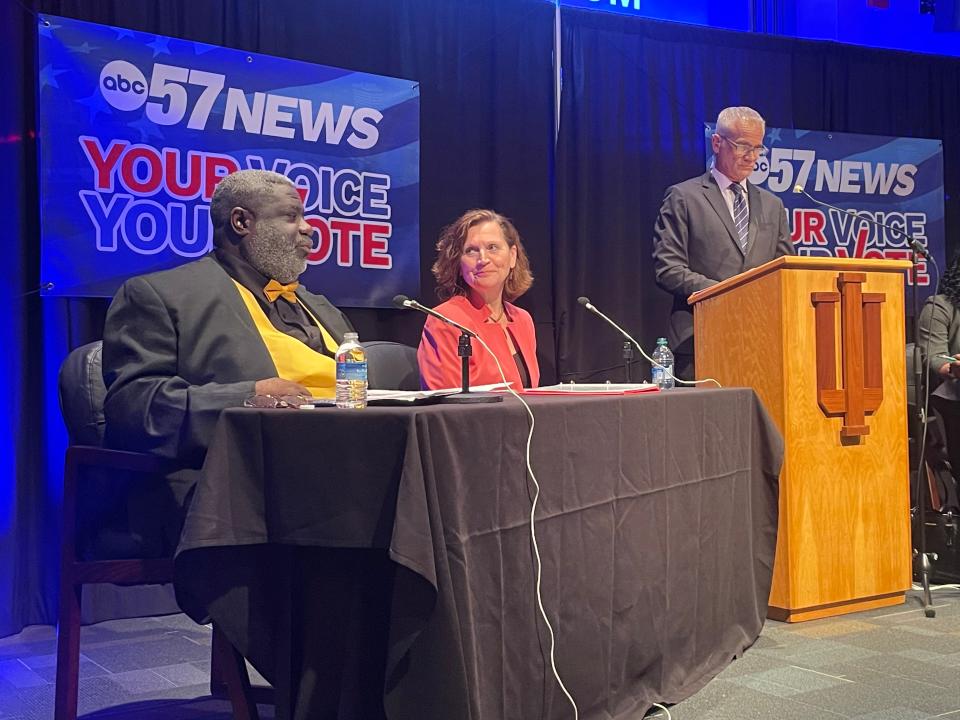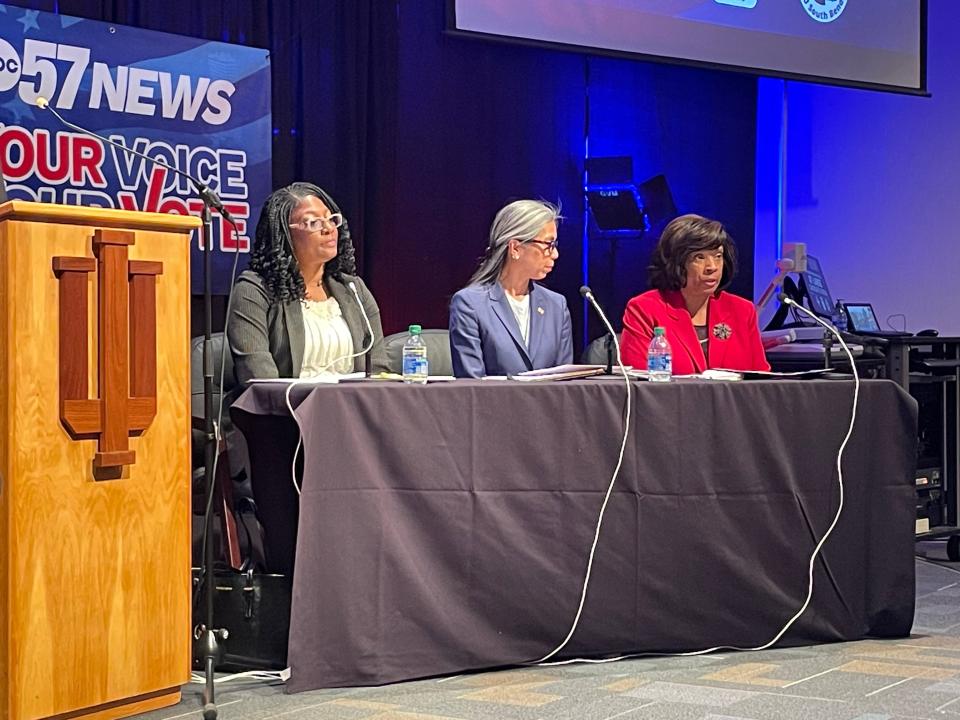South Bend council candidates debate as voter registration deadline nears

SOUTH BEND — Candidates for three citywide South Bend Common Council seats took part in the last round of debates leading up to the voter registration deadline for the May 2 primary.
Debates among Democratic candidates for South Bend mayor and city clerk were held in previous weeks. A final debate among candidates for contested council districts is to be held April 21 at the main branch of the St. Joseph County Library, according to Elizabeth Bennion, the director of Indiana University South Bend’s American Democracy Project.
More:South Bend gives $2.5 million of federal aid to support homeless shelter, emergency beds
Voters can register until April 3, and early voting begins the next day.
Here’s what you need to know about Tuesday’s debate for three at-large council seats.
Who are the candidates?
The three incumbent councilors are Lori Hamann, Rachel Tomas Morgan and Karen White. Challenging them are Oliver Davis, a social worker at South Bend schools and Saint Mary's College lecturer who previously served three terms on the council, and LaQuita Hughes, a minister and daycare owner who lost a recent bid for South Bend school board. The top three vote-earners are elected.

Hamann, a high school government and economics teacher at Marian High School, has become one of the more progressive and argumentative of the nine Democratic council members during her first term.
The debate Tuesday showed newcomer Hughes aligning herself with Hamann and against Tomas Morgan, a former administrator and faculty member at Notre Dame’s Center for Social Concerns who in her first term tended to be more moderate.
Where it'll be spent:County assigns the last of its pandemic relief dollars
Davis’ 12 years of tenure on the council makes him the second most experienced candidate behind Karen White, who has served for more than 20 years. A former South Bend school board member and longtime IUSB administrator, White pitches herself as a measured voice who seeks compromises.

As at-large councilors, the three candidates elected will serve a unique role on the council. Six members represent separate council districts and often keep primarily their constituents in mind. But the at-large councilors have a broader focus across the city.
All but one of the current council members are Democrats, and the lone Republican member is uncontested in the May primary.
Discord on how to promote affordable housing
On the issue of housing Tuesday, Hamann and Tomas Morgan voiced a common disagreement. Tomas Morgan said the key to combating South Bend’s lack of affordable housing is simple: to incentivize developers, often with tax abatements that mandate some number of lower-cost units, to build more housing.
Eventually, Tomas Morgan said, the overall supply boost will lower prices citywide. But Hamann worries that continued support for market-rate apartment units near South Bend’s downtown core is crowding out needy residents.
In a discussion at Monday’s common council meeting, Hamann called on the company that owns Liberty Tower, which will build 90 new market-rate apartments in the city’s tallest building, to accept low-income applicants with federal housing vouchers.
“The modern problem is it’s become trendy to live in the urban centers,” Hamann said. “But what we are doing is we are filling the urban centers with extremely high-cost homes and rental properties. The majority of the people in this city can’t live in these structures.”
Concerns over police’s real time crime center
Tomas Morgan has been a steady advocate of the South Bend Police Department’s choice to build a real time crime center. The center is fed by a surveillance network of cameras across the city that are meant to help officers solve crimes more efficiently and more often.
More:South Bend police plan 'real-time crime center.' Here's what the research shows
The real time crime center “is critical to solving crimes and, in turn, helping to deter crime,” Tomas Morgan said. “Both personnel and technology investments are critical to reducing crime and enhancing public safety in our community.”
But Hamann and Hughes voiced concerns about this program, which also has the support of South Bend Mayor James Mueller. Hughes, citing numerous studies, said facial recognition technology that officers may use during the investigative process can yield racist results.
Hamann referenced Detroit’s Project Greenlight, a similar initiative that as of December 2020 had led to no measurable change in violent crime rates but a substantial decrease in car-jackings, according to Michigan State University researchers. Detroit police also made a higher percentage of arrests for robberies, nonfatal shootings, homicides and car-jackings.
The at-large candidates agreed that fully staffing the South Bend Police Department earlier this month will allow officers to do proactive policing of communities instead of merely reacting to reported crimes.
More:South Bend mayor to choose between two local candidates to lead police review office
Another initiative to enhance good will between residents and police is the Community Police Review Office and a related oversight board. The intent is for residents to make complaints to the review office’s director, who will soon be named by the mayor, that will be investigated separately from SBPD.
What do the candidates name as priorities?
Davis, who’s lived in South Bend for more than 30 years, was direct with his strategy. Immediately after introducing himself, he said his cellphone number on live television, to laughs from an audience of 50 or so.
(His number is 574-876-6938. White later followed his lead; her number is 574-229-3100.)
“I’ve given out my number all throughout my career because I believe in the personal relationship with people,” Davis said.
As a licensed clinical social worker, Davis lists top priorities of promoting mental health services for young people and families impacted by guns, violence and poverty.
Hamann is especially concerned with homelessness and equitable investment across South Bend neighborhoods, she said. She’s also an author of the resolution creating the Community Police Review Board.
Hughes, a former member of the council’s Community Relations committee, said that as a Black woman who owns a business, she understands how owners in historically disadvantaged groups feel overlooked.
She noted that under the mayor’s leadership, the former director of the city’s Diversity, Compliance and Inclusion office stepped down in January after controversy surrounding his decision to fire the director of the South Bend Human Rights Commission.
Tomas Morgan also lists a focus on support for entrepreneurship among women- and minority-owned businesses on campaign flyers. She said she’ll continue to champion development on vacant lots and expanding internet access.
White said her consistency sets her apart from other candidates. She’s served nearly three decades in public service between the common council and the school board.
“I’m able to talk with anyone. I work very closely with not only elected officials but also with our stakeholders and the community,” White said. “I am the person that you can look toward, that you can understand … that I will get the job done.”
Email South Bend Tribune city reporter Jordan Smith at JTsmith@gannett.com. Follow him on Twitter: @jordantsmith09
This article originally appeared on South Bend Tribune: South Bend city office candidates debate ahead of Indiana May primary

